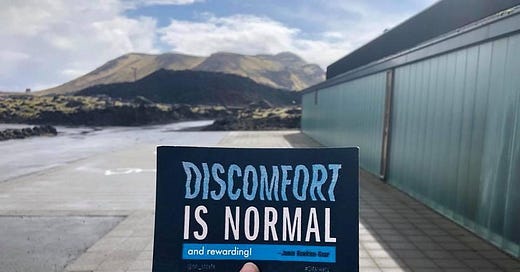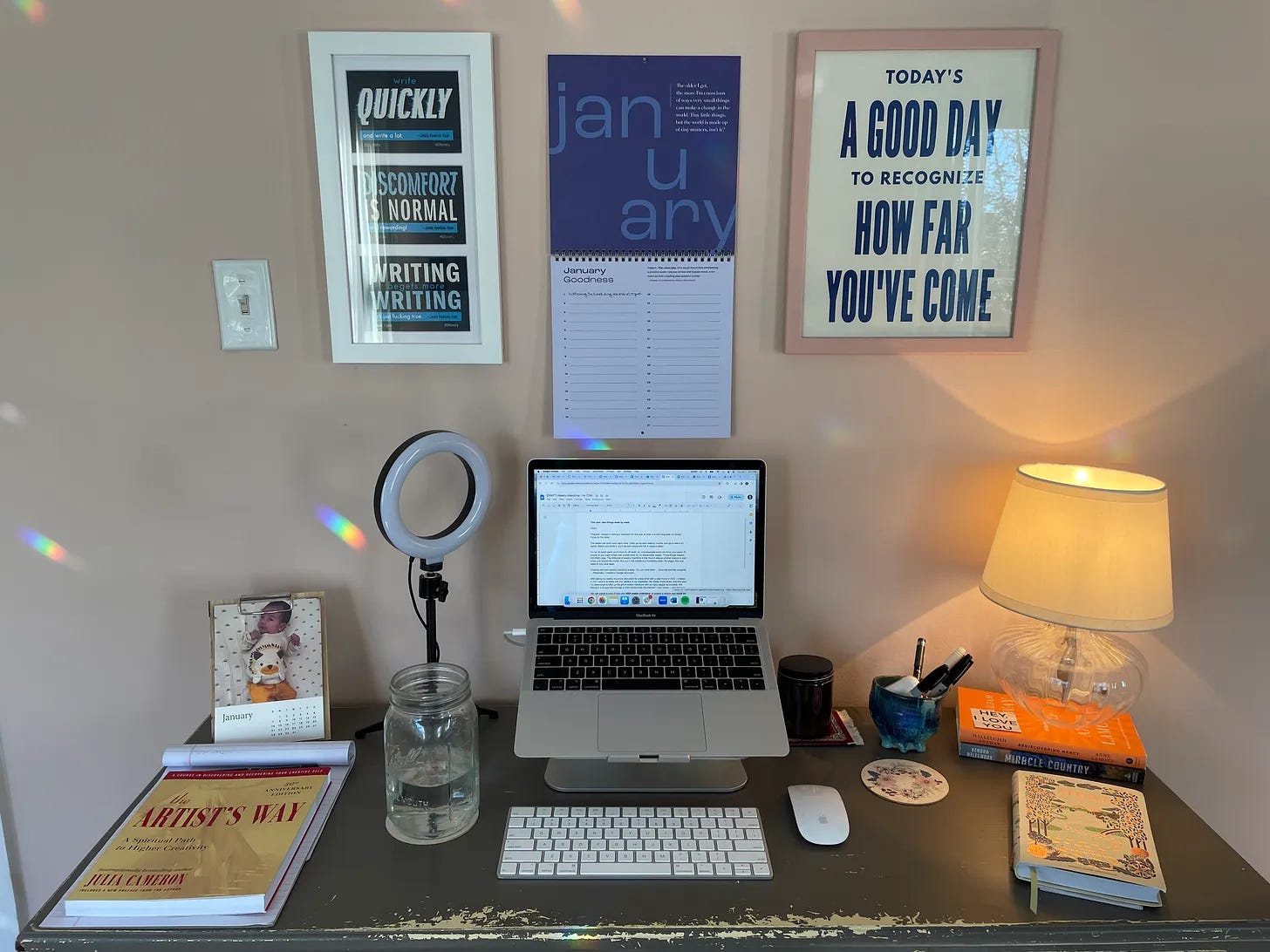As I approach 40, I’m embarking on a year-long project to reflect on the lessons I’ve learned in four decades of life. This is lesson #1.
When someone you love dies, you find yourself grasping: for comfort, for words, for hope; for ways to keep them close and keep their memory alive; for proof that they loved you.
My husband’s death was such a shock, so sudden and cruel, that I found myself grasping for a reason. I needed to know why it happened.
Jamie died while running a half marathon on a sunny February morning in 2017, collapsing less than a mile from the race’s finish line. It wasn’t until several months later, thanks to a thorough coroner’s report, that I learned that he had been born with fibromuscular dysplasia — an undiagnosed, and ultimately fatal, heart condition.
I didn’t have that information the day after his death, the day I began grasping in earnest. In my desperation, I found myself searching through Jamie’s journals and notebooks as if they held some answers — some explanation for why my seemingly healthy 32-year-old husband was no longer by my side.
I never found those answers. But I did find lots of little glimpses into Jamie’s mind. I found dozens of pocket notebooks, filled with clever comedy sketch ideas and groan-worthy puns. I rediscovered the journal he started not long after we moved to Florida, a document of his attempts to meet new people and make lasting connections. I found a few notes addressed to me that made me cry. Finally, I unearthed a handwritten list of writing lessons he’d compiled.
If I could glean any lessons from my experience writing so far:
Write quickly and write a lot. “Vomit draft” is a great way to put it. Write faster than your perfectionism/fear/insecurity can keep up. (I may regret this upon editing.)
Refill the tanks, but don’t distract.
Reading Jurassic Park and watching Brooklyn Nine-Nine are excellent ways to take a break and inspire, but getting sucked in or using sources of inspiration to avoid work is obviously bad, obviously.
Don’t be afraid to work hard. If something is stumping you or you're worried you don’t have the energy to do a scene justice, hang up your hat for a lil bit or for the day.
Drinking helps but ...
Drinking to loosen the cobwebs is like that water they use in fracking; yes, it helps get the natural gas out, but too much damages the environment. I just wrote seven great pages in the throes of stone-cold sober awareness.
Pain/discomfort is normal. And rewarding!
Writing begets more writing. It’s just fucking true.
Having a flash of inspiration is great, but. No, it is great, but so seldom and unreliable. See previous rule.
Improv/standup/other tools: IT ALL HELPS!
Jamie was a master of getting outside his comfort zone. He challenged himself as a writer, a cook, and a comedian. As a runner, too. When he wrote that list, he was working on a screenplay that no doubt challenged him. And when I found that list, I had just entered the most deeply uncomfortable period of my life.
“Uncomfortable” feels like too mild a word to describe widowhood. But I was uncomfortable pretty much everywhere — in my own home, which felt eerily quiet and empty; at work, where I had trouble focusing; around friends, who had no idea what to say or how to make an unfixable situation better; in my own skin, which ached for touch.
As it turns out, all the things people say about “comfort zones” are true. You do grow outside of them. You do evolve during the times that challenge you most. Through the incredible discomfort and pain of navigating life without Jamie, I changed — ultimately, for the better. I learned how to live alone. I discovered my own interests, in things like food, TV shows, and other potential partners. I had realization after realization about the ephemeral nature of life and how the fragility of it all made everything more beautiful and special than any of us truly knew. I became a writer, something I’d always wanted to be but was too scared to try.
I trusted my gut. I took big risks. I learned what it feels like to have my heart shatter into a million pieces and, slowly but surely, form back together again. I became stronger than I ever imagined I could be.
A year after Jamie’s death, I gave a talk for the Creative Mornings breakfast lecture series about the lessons I’d learned in the past 12 months. When the chapter organizer and I brainstormed the event, she asked if Jamie had any favorite quotes or sayings — something we could turn into handouts for attendees. At first, my mind was blank, then I remembered that list of writing observations. Maybe there was something we could use?
Tara identified three gems: “Write quickly and write a lot.” “Writing begets more writing. It’s just fucking true.” And “Discomfort is normal. And rewarding!” She worked with a local printshop to turn those quotes into beautiful postcards we handed out before my talk.
The third quote — discomfort is normal — was the most popular by far. To this day, I’ll visit friends’ houses and spot Jamie’s now-immortal words hanging on their refrigerators or propped up on their bookshelves. It makes me smile every time.
For months, I kept one of those discomfort postcards in my purse and carried it around with me everywhere I went. I was in my second year of widowhood and pushed myself even farther out from the comfort I’d once known. I quit my job. I traveled alone. I opened my heart once again. That postcard became my talisman, my wingman, my reminder that, even if things felt painful, reward was around the corner.
Jamie’s words, “Discomfort is normal. And rewarding!”, traveled with me to London, Paris, and Reykjavík. They accompanied me on a first date, a second date, and a third — when I asked Billy, my now life partner and father to our wonderful child, if I could kiss him. They were by my side on work trips and important presentations. And today, they hang alongside Jamie’s other writing quotes above my desk, where I face the discomfort — and reap the rewards — of freelance life.
These days, my life is a lot more comfortable than it used to be. I am sometimes challenged by parenting and sometimes challenged by work assignments, but, for the most part, I’ve been lacking the growth that comes with putting yourself (or being put in) an uncomfortable place. Without that challenge, I find myself feeling stagnant.
I suppose that’s why I started this series. And why I chose this lesson as my first. I love that it’s advice that applies both to writing and life. Perhaps all writing advice is life advice in disguise.
Today’s essay is the first in a series of 40 lessons. Forty! For some writers, this might be an easy goal. For me? It’s a stretch. Announcing it publicly makes me nervous. And the procrastination, anxiety, and relentless doubt I’ve felt leading up to today’s publication has shown me what a deeply uncomfortable challenge writing this series will be.
It’s not surprising, then, that I find myself grasping once more. I’m reaching for that pocket where those five encouraging words used to sit: Discomfort is normal. And rewarding!
Jamie knew that. I’m proud to say I now know it too.
xoxo KHG








I read this piece very slowly and just reading it was comforting. Too much discomfort in my life the last 4 years. But I can say out loud that I am beginning to experience "discomfort is normal and yes! rewarding. Thank you for sharing this!
Katy--I'm sure you've heard the old saw about gaining wisdom from your elders......I just want to say that thanks to you I, who am more than twice your age, feel blessed to be gaining wisdom from my "youngers".